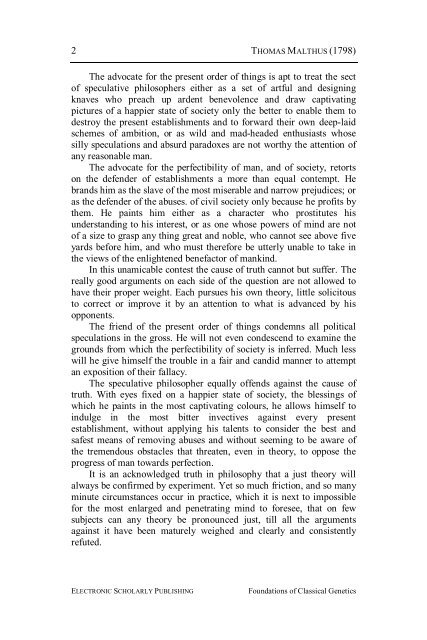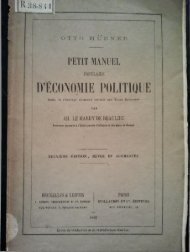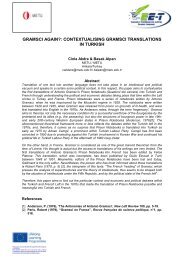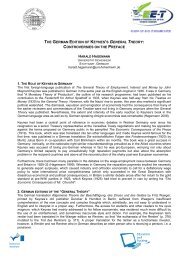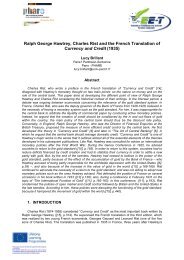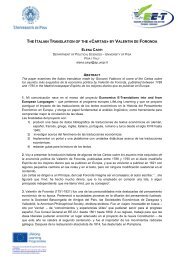Malthus, Thomas, Robert, An Essay on the Principle of Population ...
Malthus, Thomas, Robert, An Essay on the Principle of Population ...
Malthus, Thomas, Robert, An Essay on the Principle of Population ...
Create successful ePaper yourself
Turn your PDF publications into a flip-book with our unique Google optimized e-Paper software.
2 THOMAS MALTHUS (1798)<br />
The advocate for <strong>the</strong> present order <strong>of</strong> things is apt to treat <strong>the</strong> sect<br />
<strong>of</strong> speculative philosophers ei<strong>the</strong>r as a set <strong>of</strong> artful and designing<br />
knaves who preach up ardent benevolence and draw captivating<br />
pictures <strong>of</strong> a happier state <strong>of</strong> society <strong>on</strong>ly <strong>the</strong> better to enable <strong>the</strong>m to<br />
destroy <strong>the</strong> present establishments and to forward <strong>the</strong>ir own deep-laid<br />
schemes <strong>of</strong> ambiti<strong>on</strong>, or as wild and mad-headed enthusiasts whose<br />
silly speculati<strong>on</strong>s and absurd paradoxes are not worthy <strong>the</strong> attenti<strong>on</strong> <strong>of</strong><br />
any reas<strong>on</strong>able man.<br />
The advocate for <strong>the</strong> perfectibility <strong>of</strong> man, and <strong>of</strong> society, retorts<br />
<strong>on</strong> <strong>the</strong> defender <strong>of</strong> establishments a more than equal c<strong>on</strong>tempt. He<br />
brands him as <strong>the</strong> slave <strong>of</strong> <strong>the</strong> most miserable and narrow prejudices; or<br />
as <strong>the</strong> defender <strong>of</strong> <strong>the</strong> abuses. <strong>of</strong> civil society <strong>on</strong>ly because he pr<strong>of</strong>its by<br />
<strong>the</strong>m. He paints him ei<strong>the</strong>r as a character who prostitutes his<br />
understanding to his interest, or as <strong>on</strong>e whose powers <strong>of</strong> mind are not<br />
<strong>of</strong> a size to grasp any thing great and noble, who cannot see above five<br />
yards before him, and who must <strong>the</strong>refore be utterly unable to take in<br />
<strong>the</strong> views <strong>of</strong> <strong>the</strong> enlightened benefactor <strong>of</strong> mankind.<br />
In this unamicable c<strong>on</strong>test <strong>the</strong> cause <strong>of</strong> truth cannot but suffer. The<br />
really good arguments <strong>on</strong> each side <strong>of</strong> <strong>the</strong> questi<strong>on</strong> are not allowed to<br />
have <strong>the</strong>ir proper weight. Each pursues his own <strong>the</strong>ory, little solicitous<br />
to correct or improve it by an attenti<strong>on</strong> to what is advanced by his<br />
opp<strong>on</strong>ents.<br />
The friend <strong>of</strong> <strong>the</strong> present order <strong>of</strong> things c<strong>on</strong>demns all political<br />
speculati<strong>on</strong>s in <strong>the</strong> gross. He will not even c<strong>on</strong>descend to examine <strong>the</strong><br />
grounds from which <strong>the</strong> perfectibility <strong>of</strong> society is inferred. Much less<br />
will he give himself <strong>the</strong> trouble in a fair and candid manner to attempt<br />
an expositi<strong>on</strong> <strong>of</strong> <strong>the</strong>ir fallacy.<br />
The speculative philosopher equally <strong>of</strong>fends against <strong>the</strong> cause <strong>of</strong><br />
truth. With eyes fixed <strong>on</strong> a happier state <strong>of</strong> society, <strong>the</strong> blessings <strong>of</strong><br />
which he paints in <strong>the</strong> most captivating colours, he allows himself to<br />
indulge in <strong>the</strong> most bitter invectives against every present<br />
establishment, without applying his talents to c<strong>on</strong>sider <strong>the</strong> best and<br />
safest means <strong>of</strong> removing abuses and without seeming to be aware <strong>of</strong><br />
<strong>the</strong> tremendous obstacles that threaten, even in <strong>the</strong>ory, to oppose <strong>the</strong><br />
progress <strong>of</strong> man towards perfecti<strong>on</strong>.<br />
It is an acknowledged truth in philosophy that a just <strong>the</strong>ory will<br />
always be c<strong>on</strong>firmed by experiment. Yet so much fricti<strong>on</strong>, and so many<br />
minute circumstances occur in practice, which it is next to impossible<br />
for <strong>the</strong> most enlarged and penetrating mind to foresee, that <strong>on</strong> few<br />
subjects can any <strong>the</strong>ory be pr<strong>on</strong>ounced just, till all <strong>the</strong> arguments<br />
against it have been maturely weighed and clearly and c<strong>on</strong>sistently<br />
refuted.<br />
ELECTRONIC SCHOLARLY PUBLISHING<br />
Foundati<strong>on</strong>s <strong>of</strong> Classical Genetics


